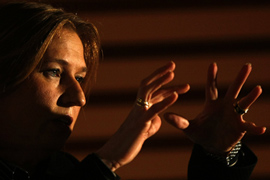Peres to decide on Israeli premier
President commences work on selecting prime minister after final election results.

Under Israeli law, the task of forming a government does not automatically go to the party that won the most votes, but the one most likely to be able to form a majority coalition.
The election was the worst-ever showing for the Labor party, which won just 13 seats. The religious Shas party got 11.
Jacky Rowland, Al Jazeera’s correspondent in Jerusalem, said: “What Peres is trying to do is create a stable, strong government that really reflects the views and the wishes of the Israeli electorate.
“After consulting with the smaller parties, it will be down to President Peres to make an assessment over which individual politician is most likely to be able to create a stable government, which is in the greatest interests of Israel.”
Primary talks
Peres said he would hold talks with party leaders before deciding whom he should ask to form a new government.
“I intend to consider public sentiment and the outcome of the elections, and to decide only after consulting with all of the Knesset [parliament] factions,” he said.
Livni and Netanyahu have each staked a claim to be prime minister.
Some analysts say that Netanyahu has a better chance of building a majority in the 120-seat parliament, with Yisrael Beitenu likely to lend him support.
Gideon Levy from Israel’s Haaretz newspaper told Al Jazeera: “We have this strange phenomenon in which an election took place and there is no real winner but, having said this, I think that finally with [Yisrael Beitenu leader] Avigdor Lieberman or without his support, Netanyahu will be the next prime minister of Israel.
“Until the very last minute it will not be clear what he [Lieberman] decides … but I think that finally, after all the games, it will be Netanyahu.”
Coalition appeal
Rightist parties made sweeping gains in the election, which was held just over three weeks after Israel led a 22-day war on the Gaza Strip.
 |
| Livni may take the position of prime minister with a coalition with smaller parties [AFP] |
Kadima on Sunday suggested a power-sharing deal with Likud but Netanyahu has dismissed the idea.
However, he has said that he favours having Kadima in a broad coalition of parties rather than just organisations that are likely to be supportive of Likud’s stance on the Palestinians.
Livni has said that she wishes to continue holding US-backed peace talks with the Palestinian Authority (PA) and that Israel must be prepared to give up the occupied West Bank as part of a final status deal.
However, Yisrael Beitenu and other rightist parties in the Knesset remain opposed to pulling out of the territory and are supportive of settlement expansion there, despite it being contrary to international law.
The candidate named by Peres will have 28 days to put together a ruling coalition. The president can extend the deadline by 14 days.
Parliamentary elections were called after Ehud Olmert, the prime minister, handed in his resignation in September over a series of corruption scandals.
He has stayed on as acting prime minister.